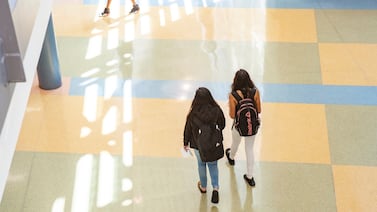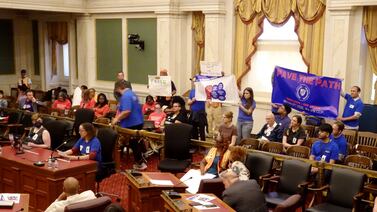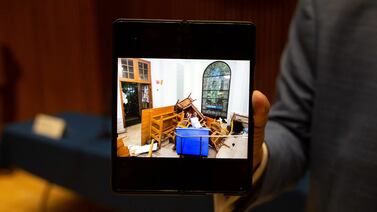Marianna Lucero is the kind of person who brings others into the circle of belonging.
As a college intern, she recruited Spanish-speaking children to a summer arts camp after noticing they were conspicuously absent. As a drama and dance teacher at Denver’s Goldrick Elementary School, she crafts lessons that reflect the lives of her Latinx students. And when she was recently asked to be photographed for an outdoor mural project, she invited some of her dance team students to participate, too.
When the mural was unveiled in southwest Denver, she said, “It was one of the most incredible moments of my life to see my students and their families glowing in greatness as they saw their photos on a large scale art piece that seeks to inspire healing and pride within our community.”
Lucero, who recently won the Colorado Thespians’ Elementary Educator of the Year award, talked about starting the school day with laughter, her Día de los Muertos lesson, and how her work as an actor at Denver’s Chicano theater, Su Teatro, influences her teaching.
This interview has been lightly edited for length and clarity.
Was there a moment when you decided to become a teacher?
During my junior year at the University of Colorado Denver, I was an intern for A Theatre Group in Silverton, whose mission is to foster the development of professional, emerging, and community artists. I can only describe Silverton as a perfect slice of heaven on earth, a beautiful town in the mountains of San Juan County.
I had the dream job of helping run a summer arts camp with a small group of interns. Our group was led by the late and beloved Mollie Mook Fiddler, one of my theater professors at the University of Colorado Denver. During my time in Silverton, Mollie saw something in me that I never saw in myself. Having dealt with depression and anxiety my entire life, she recognized the storm I was fighting within myself, but she embraced every bit of me.
I noticed that there was a large Mexican population in Silverton, but that none of the children had joined the camp yet. We recruited a small group of Spanish-speaking campers, assuring their families that I would lead them and work to translate the curriculum. By the end of the summer, I had built an unbreakable bond with my small Spanish-speaking group. Our summer culminated in a beautiful performance of “The Lion, the Witch and the Wardrobe,” with my group also performing a poem about Aslan, completely in Spanish. I was so proud of my students, and I felt a clarity like I had never felt before. My destiny was to become a drama teacher in the community where I grew up and to work with English language Learners.
How have you shifted to teaching theater and dance remotely this year?
Like many teachers, I was completely overwhelmed. In fact, I am still overwhelmed, but my students’ resilience, compassion, and humor gives me the strength and inspiration to create remote lessons where we use technology and pop culture to our advantage.
Every morning, we begin with some instrumentals by the musician J Dilla playing lightly in the background while students fill in a funny blank meme using the chat. This ensures that we always start our mornings with laughter. Then we go into some lively movement or dance warm-ups. After that, I do a mini lesson. These have included creating dialogue using comic book strips, improvising mini performances of well-known fairy tales like “The Three Little Pigs” — where students insert parts of their experiences, identities, and cultures into the stories — and creating innovative character costumes from things in their own homes.
Have you encountered any silver linings to teaching remotely?
My dream has always been to expand my programming to more students in my community, so I created In Lak’ech Denver Arts in 2019 as a way to help students in southwest Denver use the arts to broaden their social awareness, create cross-cultural connections, and inspire social advocacy.
After we moved to remote learning last spring, I piloted two virtual arts workshops and one two-week hybrid summer arts camp I called, “Puppets at the Parque.” My summer camp was in collaboration with The Confluence Center, a media arts maker space in Montbello, and the Xicano Puppet Theater. Together, we ran an incredible arts camp experience for fifth to eighth grade students in southwest Denver and Montbello. Both cohorts of students had the opportunity to participate virtually or in-person at a local park. Students learned how to use the art of puppetry to retell indigenous stories and create personal pieces about social justice.
At the culmination of our camp we presented a show at the park that families attended. Performances included a puppet show that retold stories from the Maya and the Mexica (Me-sheeka) tribes, as well as powerful narratives that were written by students about the complexities of family and the impact of ICE raids on communities of color.
How do you bring your experiences as a company actor for Su Teatro into your instruction?
Su Teatro taught me that our stories deserve a platform. They taught me to seek out the truth about my ancestors and that being a Xicana — an identity that reflects my Mexican and indigenous roots — is one of the greatest honors of my life. I hope that through my instruction, I am able to teach my students that same kind radical self-love, while showing them how to reclaim spaces that have been historically taken from us.
Tell us about a favorite lesson to teach. Where did the idea come from?
One of my favorite units to teach is about Día de los Muertos, or Day of the Dead. Originally called Mihcailhuitl by the Mexica — more widely known as the Aztecs — Día de los Muertos is an ancient ritual that honors our ancestors and celebrates the spirit of loved ones who have passed. Indigenous people have been practicing this ritual for thousands of years, holding the strong belief that death is not the end of life, but a continuation of life.
I created this unit because it is relevant to the large Latinx population that I teach at Goldrick, but it resonates with all of our students because it gives us the space to reflect on how different people honor their dead.
By now, I would be deep in rehearsals and preparations for our annual Goldrick production, “Viva La Vida!,” a Día de los Muertos celebration of life, but COVID-19 had different plans for us. This annual tradition is more important than ever as we grieve from so much loss due to the pandemic and recent violence in southwest Denver. This year’s unit will be taught remotely, but my hope is that I am still able to create a safe space for my students to delve into the rich history of our ancestors and use their knowledge and strength to create virtual altares — or alters.
What was the biggest misconception that you initially brought to teaching?
I think one of the biggest misconceptions I had was that I would have a healthy sleep schedule. In all sincerity, I knew what I was getting myself into work wise, but what came as a beautiful realization was how close I would become to all of my students. I love them so much. I am a maestra — a teacher — wherever I go.









